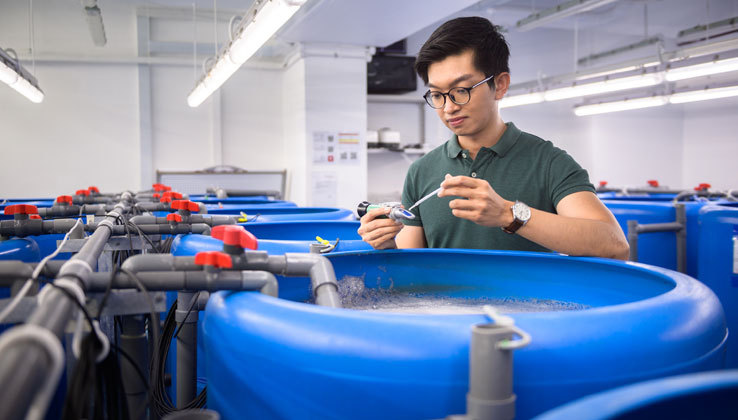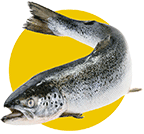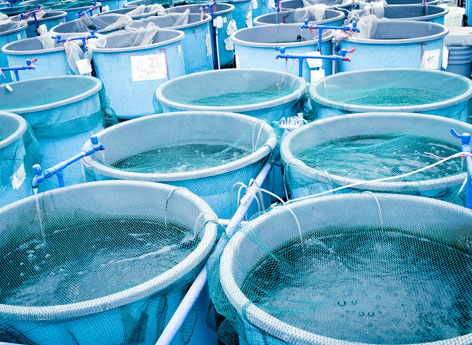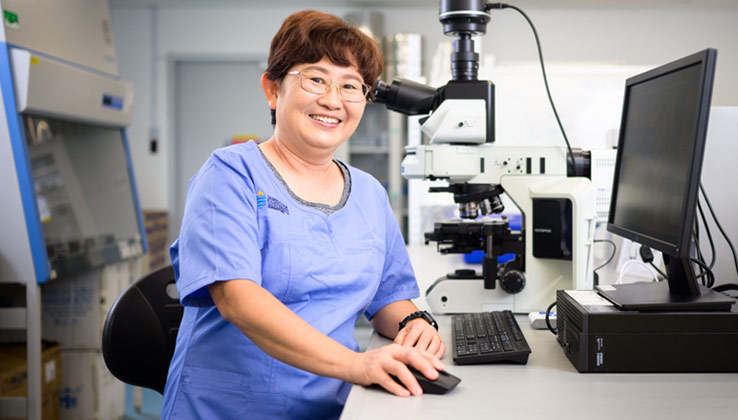PHOTOGRAPHY JOSEPH NAIR
James Cook University’s Aquaculture
degree programme is playing a key role in
building Singapore’s food resilience.
C hew Xian Zhe, 28, has been fascinated with fish since he was a young, and in particular, keeping his aquarium fish alive and well. “I have always been interested in fish health,” he says. This early desire to be a “fish doctor” marked the start of a lifelong journey where he pursued a doctorate in Aquaculture, which later led him to work on a fish farm in Singapore. His job involves checking on fish health, analysing data and using them to implement measures to improve the welfare of farmed fish.

“JCU is world-famous for higher education in tropical aquaculture, and a global leader in applied research in this field. So the choice for me was obvious."
CHEW XIAN ZHE,HIGHER DEGREE BY RESEARCH CANDIDATE RESEARCHING FISH PARASITES, JCU
When it came to deciding where to study to realise his passion, Mr Chew looked no further than the Singapore campus of James Cook University (JCU), the only tertiary institution to offer an Aquaculture major and Higher Degree by Research course locally. Mr Chew graduated with a Graduate Diploma of Research Methods (Tropical Environments and Societies) in early 2019, and is currently a Higher Degree by Research candidate researching on barramundi health at the university.
“JCU is world-famous for higher education in tropical aquaculture, and a global leader in applied research in this field. So the choice for me was obvious,” he explains.
Meeting a growing need
JCU’s Aquaculture programme started in 2017, at a time when Singapore and the world was facing increasing food security challenges. Singapore imports more than 90 per cent of food consumed in the country. According to the Singapore Food Agency (previously Agri-Food and Veterinary Authority of Singapore), only nine per cent of all fish eaten in Singapore was produced locally in 2018.
With looming threats such as global pandemics on potential disruptions in food supply, the government is looking for ways to improve the country’s food resilience. Last year, Singapore announced the “30 by 30” initiative, which aims to raise Singapore’s local food production level from the current 10 per cent to 30 per cent of total food needs by 2030 — mainly through high-tech vegetable farms and aquaculture farms.
The focus on Aquaculture as a source of food means a growing demand for Aquaculture graduates, observes Dr Susan Gibson-Kueh, Senior Research Fellow Aquaculture at JCU. “There will be a pressing need for graduates with industry-relevant skills. Aquaculture is the fastest-growing food production sector globally, and highly dependent on technology to increase productivity. Suitably-skilled graduates will be needed to manage, operate and support this industry in Singapore and the entire Asia Pacific regions.”


More than S$55 million has been set aside by Enterprise Singapore to help agriculture and aquaculture firms innovate.
A sunrise sector
Aquaculture and related industries, such as seafood-processing businesses, pharmaceuticals and feed manufacturing, offer graduates like Mr Chew a wide range of careers to choose from, including business managers, farm managers, technical support staff, nutritionists, engineers, biologists and geneticists.
“There is a lot more to aquaculture than just fish farming. It is a science- and technology-driven industry. You can specialise in nutrition, genetics or smart technologies to monitor and manage operations, or fish health,” says Mr Chew.
In July 2019, the Singapore campus of JCU launched a new Aquaculture Research and Teaching Facility to meet increasing demands for graduates and postgraduates to service this sector. This allows the university’s world-class expertise in tropical Aquaculture to effectively contribute directly into growing Aquaculture in Singapore and the region.
Mr Chew has benefitted from these resources and is applying skills from his time at JCU to his current role. “I have acquired many techniques to assess fish health, such as molecular genetics, haematology and microscopy. I can use my new skills to help the farm improve health, and optimise production,” he says.


“There will be a pressing need for graduates with industry-relevant skills. Aquaculture is the fastest-growing food production sector globally, and highly dependent on technology to increase productivity."
DR SUSAN GIBSON-KUEH, SENIOR RESEARCH FELLOW AQUACULTURE, JCUStaying relevant to industry
To keep its programme relevant, JCU has forged valuable partnerships with both government and industry. The university is working with barramundi farms in Singapore and Southeast Asia to better understand a devastating disease affecting the species called “scale drop disease”. “We work closely with industry, and work on industry-relevant issues. This helps us effectively translate our research on fish disease directly to health management, and improved production,” says Dr Gibson-Kueh.
JCU is also contributing to the Government’s “30 by 30” initiative as a member of the Centre of Innovation in Aquaculture located at Temasek Polytechnic. The centre brings together very diverse knowledge and experience from different partners — including tertiary institutes and government agencies — to collaborate to benefit the Aquaculture sector in Singapore.
Under a memorandum of understanding that spans three years, Tropical Futures Institute and National University of Singapore will work together to discuss and develop research collaborations, in the area of agriculture technology and Aquaculture technology innovation.
Amid these exciting developments, Mr Chew looks forward to playing a bigger role in elevating Aquaculture production locally. “I can stay in the industry to contribute to its future growth, or I can teach and share my knowledge when the opportunity arises.”

Less than
%
of Singapore’s land is allocated to farming, so increasing food production will have to involve non-traditional farming methods such as aquaponics.

You might also be interested in...
EDUCATION
Paving the way
for a better future
James Cook University offers a visionary
education for a meaningful career that can
make an impact on the world.
SCIENCE
Turning the tide
on climate change
As the climate crisis continues, James Cook University
is training professionals who can help businesses
mitigate their impact on the environment.











